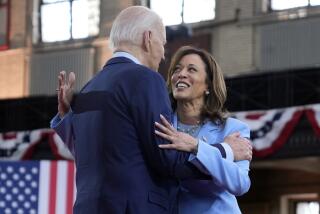Speculation on pope’s successor turns to Africa, Latin America
- Share via
Pope Benedict XVI’s decision to resign has rekindled debate within the Catholic Church and worldwide speculation about the possibility that the church will reach beyond the European clergy who have long held power in the Vatican to choose the next pope.
With an eye to vibrant Catholic communities in Africa, Latin America and Southeast Asia, the Sacred College of Cardinals may weigh the pros and cons of selecting the next pope from another continent.
Here are cardinals believed to be possible choices:
Peter Kodwo Appiah Turkson of Ghana is an African prelate seen as a top contender, and at 64 would be better positioned than older candidates to carry on the doctrine of John Paul II and Benedict XVI through what could be a time of growing Catholic influence in the developing world. Currently president of the Pontifical Council for Justice and Peace, Turkson has spent much of his career in religious academia. He has a doctorate in sacred scripture and has been a professor at St. Teresa’s Seminary in his home country as well as vice rector at St. Peter’s Seminary. His negative views on the merits of using condoms to prevent the spread of HIV/AIDS, though, have alienated reformists within the church. In 2009, he reaffirmed the church’s position against contraception, urging abstinence and fidelity instead.
PHOTOS: Pope Benedict XVI to step down
Francis Arinze of Nigeria was considered a strong possibility to succeed Pope John Paul IIin 2005 and has emerged again in the speculation over who will follow Benedict XVI. A former prefect of the Congregation for Divine Worship and Discipline of the Sacraments, he served as a key advisor to Pope John Paul II and succeeded Benedict as Cardinal Bishop of Velletri-Segni in 2005. Arinze became the youngest bishop in the world in 1965 when he was ordained and assigned to prepare to become Archbishop of Onitsha, a post he assumed two years later. Now 80, Arinze may be considered too old to head the Vatican, especially in the wake of Benedict’s short tenure.
Odilo Scherer, 63, a Brazilian of German descent, is archbishop of the massive Sao Paolo diocese, the world’s largest Catholic congregation. He could be considered the front-runner if the cardinals choose to recognize Latin America’s strength within the church, a region encompassing 42% of the world’s Catholics. Made a cardinal by Benedict less than six years ago, Scherer has urged the church hierarchy to more vigorously practice evangelism and has spoken favorably of liberation theology’s focus on social justice and the needs of the poor.
FULL TEXT: Pope Benedict XVI’s announcement
Joao Braz de Aviz, a 65-year-old Brazilian, is another forceful advocate for the poor in Latin America. He is seen as having reinvigorated the Vatican department for religious congregations since his appointment two years ago. A former archbishop of Brasilia, Braz was elevated to cardinal less than a year ago. He has been critical of the church’s slide into doctrinal and ideological infighting, urging the clergy to “rebuild trust” and to heed the concerns of the faithful.
Marc Ouellet of Canada serves as prefect of the Congregation of Bishops, essentially the Vatican’s chief of staff. He is also president of the Pontifical Commission for Latin America. Ouellet spent most of his religious career as a professor in Canadian seminaries and was Primate of Canada when John Paul II elevated him to the cardinalate a decade ago. Ouellet, 68, has been critical of what he suggests has been an overly liberal interpretation of the teachings of the Second Vatican Council, which he says has led to many Catholics drifting from core tenets of their faith. His name surfaced as a long-shot possibility to succeed John Paul II in 2005, and is seen as having moved up in the list of papal contenders. He is multilingual and spent years in missionary work in South America.
Luis Tagle, at 55 the youngest of the cardinals whose name comes up in succession speculation, is a native of the Philippines and as such represents the strongest Catholic congregation in Asia. He is often compared with John Paul II in personality and charisma, and has also been closely associated with Benedict through his work at the International Theological Commission. But his relative youth and inexperience in the hierarchy – he was promoted to cardinal just a year ago -- could push down his prospects.
Other names that appear in the list of potential successors:
Leonardo Sandri, 69, Argentinian of Italian descent, head of Vatican department for Eastern Churches
Timothy Dolan, 62, U.S., archbishop of New York
Angelo Scola, 71, Italian, archbishop of Milan
Dionigi Tettamanzi, 78, Italian, archbishop emeritus of Milan
Gianfranco Ravasi, 70, Italian, president of the Pontifical Council for Culture
Óscar Andrés Rodríguez Maradiaga, 70, Honduran, archbishop of Tegucigalpa
Claudio Hummes, 78, Brazilian, former prefect for the Congregation for the Clergy
Christoph Schoenborn, 67, Austrian, archbishop of Vienna with reformist profile
ALSO:
Pope confided in brother about his infirmity
Ritualized vote will choose successor to Pope Benedict XVI
Pope Benedict XVI to become first pope in 600 years to resign
More to Read
Sign up for Essential California
The most important California stories and recommendations in your inbox every morning.
You may occasionally receive promotional content from the Los Angeles Times.











